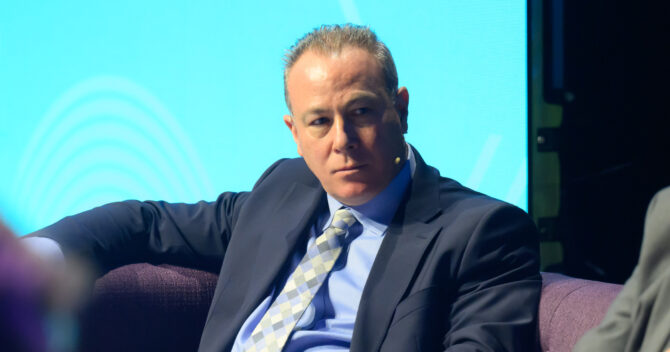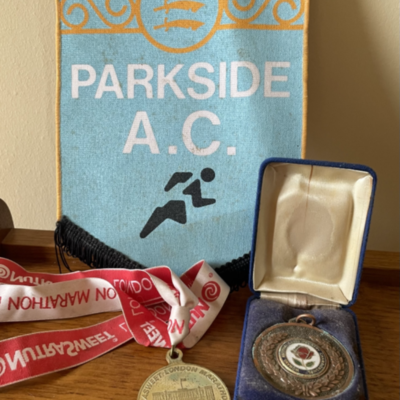Capital City College boss Angela Joyce reveals how her racing driver dad showed her life in the fast lane – and she now even runs a cattery in her downtime
Angela Joyce is not your typical college leader. With boundless energy and a willingness to take on challenges others would shy from, she reveals her passion for tackling complex problems drove her rapid rise to the top of one of the country’s largest college groups.
While many are perhaps fearful of Ofsted inspectors, Joyce married one (Paul Joyce, Ofsted’s deputy director for FE and skills). They share their Warwickshire home with a menagerie of horses, chickens, sheep, and up to 74 cats. Because alongside her job as chief executive of Capital City College, the country’s second-biggest college group, she runs a cattery.
Despite a gruelling four-hour daily commute to and from London, Joyce also finds time for showjumping and was once a national cross-country runner.
But taking on Capital City College in January 2024 was a relatively safe bet. She took on her previous two roles, leading Peterborough Regional College and then Warwickshire College Group, when both faced headwinds.
A “constant theme” is she has “never been shy of tackling big issues, asking difficult questions, and taking things on that maybe others might seek to avoid”.
“For me, I always need the next challenge,” she says.

Power couple
Paul is also taking on a fresh challenge; after 20 years with the inspectorate he moves to North Warwickshire and South Leicestershire College as deputy principal this summer.
While being married to Paul has given Joyce “an insight into a civil servant’s perspective,” she has taught him “the reality of running a large college”. They have “raised the roof a couple of times in our house” during “healthy debates” over policy.
And though she can be eyed with suspicion by recently-inspected college principals, she dismisses the idea she’s got the inside line because “at home we have other things to talk about. Like cats!”
Joyce’s own pet cats (Bertie, Basil and Beatrice) are, like her, big personalities – literally. They are Maine Coons, the largest non-hybrid cat breed. Bertie, who weighs 10kg, likes to sleep on Joyce. (“I can still breathe, just about.”)
Fortunately, she has “never needed” more than four hours of sleep a night and believes you can “train your body to get used to that amount”. Paul is “the opposite” and “could fall asleep on a washing line!”

Fast cars to FE
Joyce credits her dad, a former Formula 1 racing driver, for her can-do attitude and “fairly direct, straightforward” way of communicating.
Her background is different from many FE principals who wear their working-class roots as a badge of honour. Her dad had quit racing for a safer career as an entrepreneur and would pick her up from her grammar school to take her back to their smallholding in Buckinghamshire “driving anything from Land Rovers to Jaguars to a Beetle. He always loved his cars”.
He taught her to drive with “one proper driving lesson an hour before my test,” during which he took her to 50mph in her Metro before yanking on the handbrake.
Fortunately, she passed first time; “otherwise, I would’ve been disowned!”
Joyce was “raised with a mindset of ‘be whatever you want to be’,” but her background means she does not “buy into the story that we’re misunderstood [in FE] because nobody [in power] has been through college”.
“Just because I didn’t go to college doesn’t mean I value what we do any less,” she says.
One-college ethos
Joyce is finding it “nice to be back at this end of the country” after years working in the Midlands.
Capital City College is made up of three legacy colleges spread across 10 sites across central and north London, working relatively independently of each other.
Since taking over as CEO she has dropped the ‘group’ from its brand name and embarked on a “one-college ethos,” so management structures now look “across the group”.
In 2023-24, the college achieved earnings before interest, tax, depreciation and amortisation (EBITDA) of £5.3 million and an operating deficit of £4.6 million. It is banking on growing student recruitment and additional cost-efficiency measures to turn around the deficit this year.

With the London Growth Plan published a few weeks ago and the college now drawing up a five-year plan, Joyce is pleased to have “as many knowns as we can” in terms of policy direction, and believes “exciting times” lie ahead.
She wants to grow the college’s reputation – despite having 38,000 students “we’re probably the least well known” – and is exploring markets outside London and abroad.
Joyce says: “The great thing about being at the start [of the planning process] is you just go, ‘what’s the art of the possible? And how do we narrow that list?’ If there’s more runways at Heathrow, what doors does that open?”
Animal ambitions
Joyce has an appreciation of the challenges faced by employers, particularly small businesses, from her experience running the cattery.
The Joyces acquired the business six years ago with the ethos that “if you enjoy what you’re doing, you do it well” – and she loves cats.
But the only time Joyce’s brain “just focuses on one thing” is when she is eventing with her horses, which involves dressage, show-jumping and cross-country competitions. “I have to focus, otherwise we’ll end up in a heap!” she says.

In her youth Joyce excelled as a long-distance track and cross-country runner and competed in the European cross-country championships.
At Loughborough University she studied sports science and English in the same year as Paula Radcliffe, so it was a triumph “just to get a place in the team”.
After her degree, she did a PGCE in preparation for becoming a physical training officer for the Royal Air Force, but ditched the idea after realising it meant committing to 15 years of service.
After getting “under my father’s feet,” he encouraged her to use her qualified teacher status, so she taught English and PE in secondary schools in Leicestershire.
When an opportunity arose to develop new sports provision for Moulton, a land-based college in Northamptonshire, the job became the “making” of her FE career and her marriage (she met Paul there).
With no staff or facilities for her 15 BTEC sports students, Joyce made use of the sprawling 450-hectare estate by arranging horse riding, clay pigeon shooting, sailing in a reservoir and “a lot of cross country running”.
By the time she left nine years later, sport was “huge” there with a rugby academy in partnership with the Northampton Saints, a football academy with Northampton Town Football Club and a basketball academy that won the national championships.
Joyce loved the opportunity FE gave her to innovate in her curriculum and delivery, and her next role aged 30 was as vice principal for curriculum and quality at Peterborough Regional College.
When she attended that year’s Association of Colleges conference, Joyce suspects some attendees were “convinced someone had brought along their PA” when they spotted her, given her relative youthfulness. “Nobody would talk to me,” she recalls.
“Now it just makes me chuckle.…I probably did feel a bit on the edges in settings like that, but it didn’t hold me back.”
Then, at 34, Joyce became the principal. At the time, Peterborough had “massive quality issues” and Joyce was working “24-7”, convinced she should “have all the answers”. She still works 24-7 but has since “learned the art of developing a team” around her.

Warwickshire woes
Joyce joined Warwickshire College Group (WCG) when it was simply ‘Warwickshire College’ and all the sites, some of which were once independent colleges, had been branded as ‘Warwickshire College’.
Joyce saw this wasn’t working so “pulled” Rugby, Royal Leamington Spa, Warwick Trident, Moreton Morrell and Pershore colleges “back out to their original identities”. Joyce believes that, like Capital City College Group, there is “huge benefit to thinking and acting as one college” – but while also “respecting the individual personalities, cultures and communities within a group structure”.
Then she merged the group with what was South Worcestershire College, reverting its two campuses back to their historical names of Malvern Hills College and Evesham College.
She took on WCG knowing it was financially stretched – its debt was over 50 per cent of income – but “wanted the challenge”.
Testing time
As someone who “always has a plan”, Joyce considers Covid was the most “testing time” of her career because she found herself “running out” of options. Forty per cent of Warwickshire’s income was commercial, with lockdowns shutting down those operations overnight.
Previously she rejected as “absolute nonsense” the idea that being a college leader was a lonely job. But Joyce recalls the loneliness she felt sitting in her front room thinking, “if I can’t balance the books, what am I going to do?”
Her “brilliant team” who she spoke to every day at 4pm kept her going, and after they returned to office life, the 4pm catch-ups were kept to “just chat for 10 minutes” and keep spirits up.
The focus on paying down debt meant the college’s financial health improved in 2020/21 despite low or negative operating surpluses. But in 2022 reclassification “changed the game”, as the group’s “really good” relationship with its bank was “taken away overnight”.
Then a funding audit in 2023 resulted in a clawback (still to be finalised) which hit the college hard.

“When you’ve got some money in the bank, a bit of clawback doesn’t hurt you that hard, because you pay it back and it doesn’t hit the headlines,” Joyce says. “When you’re financially challenged, and reclassification means your overdraft facilities have been removed overnight and you can’t work with your bank, it’s a slightly different story.”
Last year after Joyce had left, Warwickshire requested government bailout loans totalling £4.7 million to cover its existing bank loan and swerve insolvency, and a financial support package was approved by the Department for Education.
Joyce says its financial position when she left was “a lot, lot better when I left than when I arrived” and points out that she and her team “maintained the quality” of provision; “Ofsted came and went with grade twos every time… students were first and foremost”.
Comfortable deputies
Joyce has no regrets about the decisions she made. She is “really proud that the college continued in quite a big geography”, that “key partnerships”, such as with Jaguar Land Rover, were maintained and that “difficult decisions meant that actually we paid off the debt. If we hadn’t I’m not quite sure where we’d have been”.
She believes characters like her who are willing to take on challenged colleges are becoming a rarity, which “very much” concerns her.
“A lot of people” in FE are “happy being number two” because “as principal you’re exposed as the ultimate decision maker”, she says.
While reclassification has “made [leadership] more difficult,” the FE sector is also partly to blame for “not being great at celebrating success”.
Joyce says: “We’re very quick to lay blame and point fingers, but this is a tough job. When the likes of me retire, are there enough people coming forward? There are probably easier things – like running a cattery!”









Am I going mad? Has the Trumpian influence reached UK FE analysis? How is this a successful track record?
Perhaps it is me…
What a load of bs. Why is an article like this even appearing on FEWeek? This so called FE leader has not added any value to the organisations she has led. Quite possibly the opposite
She got rid of some of the most committed, skillful and respected staff in the college totally unnecessarily -the very people who had a huge impact on the success of CCCG and its learners’ outcomes. I am yet to be convinced that she has the respect of CCCG’s staff.
In the same vein as the previous comment; in this trumpian age of misinformation, this article is about the ego of a person, justification for her poor decisions and her ambitions. But at what cost to FE and those who are unlucky enough to have her as a leader?
We need leaders who can create change and are bold enough to challenge norms. FE gets trodden on because too many college leaders and their representatives just say ‘yes, sir (or madam)’.